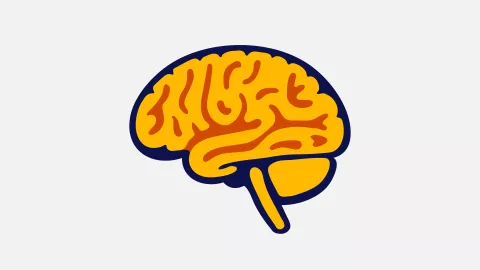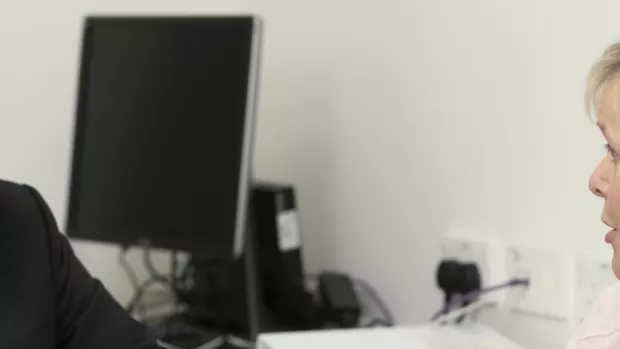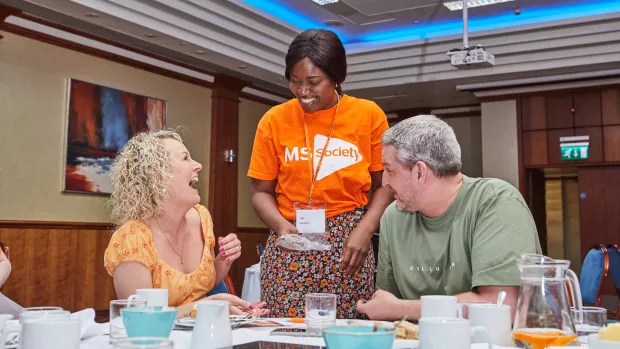
Memory and thinking
Problems with memory and thinking - also called 'cognitive problems' - can affect people with MS, but most people will be affected mildly.
Some people find it harder to find the right words, to concentrate or to recall things quickly. People with MS sometimes talk about 'brain fog' or 'cog fog' to explain how they feel.
Speak to a doctor or your MS team if you or those close to you notice cognitive symptoms. They can work with you - to find ways to manage them and perhaps treat the cause. These things might not always be caused by MS. And sometimes common issues like stress or sleep problems might be having an effect.
If you feel low, worried or anxious about cognitive changes, they can support you with this too. You can also talk to our MS Helpline on 0808 800 8000.
Find out more about MS memory and thinking problems:
- 'Cognition' or 'cognitive' mean memory and thinking
- How common are memory and thinking problems with MS?
- How can MS affect my memory or thinking?
- The impact of cognitive problems
- What causes cognitive problems?
- Who gets cognitive problems with MS?
- Can MS cognitive problems get worse?
- Getting help for cognitive problems
- Tips for dealing with memory and thinking problems
'Cognition' or 'cognitive' mean memory and thinking
'Cognition' and 'cognitive' are words to describe the way we:
- remember things
- concentrate and focus attention
- do more than one thing at a time (multitask)
- learn new things
- reason and solve problems
Cognition and cognitive also mean how we:
- plan, carry out and monitor our own activities
- understand and use language (including finding the right words)
- recognise objects, assemble things and judge distances
These skills vary naturally in different people. What’s called 'normal' means we can cope with everyday life. With or without MS, we all have different strengths and weaknesses.
How common are memory and thinking problems with MS?
Somewhere between 4 and 7 in every 10 people with MS will experience some kind of changes in memory or thinking. Mostly, these changes are mild to moderate rather than severe. And not everyone with MS will experience cognitive difficulties.
We can’t be more certain about how common such changes are because different studies have measured changes in different ways.
Cognitive symptoms in MS are sometimes called 'invisible symptoms'. They might go unnoticed, especially by other people. Your MS team or doctor can help monitor your cognitive skills to help manage any changes.
Read more about explaining symptoms when you need to
How can MS affect my memory or thinking?
Like other symptoms of MS, cognitive issues can vary greatly from person to person. They might vary from day to day. The more common MS cognitive symptoms are to do with:
- learning and memory
- attention, concentration and mental speed
- solving problems
- finding the right words
People with MS tend to have fewer problems with recognising things (visual perception) and judging distances and position (spatial relations).
Just because you have some MS cognitive symptoms doesn’t mean you’ll experience all of them.
MS can affect memory and thinking in different ways:
Can MS cause memory loss?
With MS, some kinds of memory might be affected more than others. There are different types of memory, and the brain organises these in different ways.
Remembering to do things – prospective memory
MS often affects people’s ability to remember to do things, like sending a birthday card in time or to replying to an important email. This is called 'prospective memory'.
Finding a memory when you need it – recall
Some people with MS say it takes more time and effort to actively search for a memory. This is known as 'recall'. Recall of recent memories can be difficult. For example, names of new people, shopping lists, daily tasks, or whether you’ve taken medication.
Memories of events and experiences – episodic memory
MS might also affect memories of events and personal experiences. This is called 'episodic memory', which is a type of long-term memory. For example, details from specific events such as moving into a new home may not be as clear anymore.
Knowing straight away what something is – recognition
Recognition is rarely affected in MS. This is the ability to know straight away what something is when you see or hear it, without making an effort to remember.
Some memory problems are rare with MS
As well as 'recognition', some other memory problems are rare with MS. People with MS rarely have problems with remembering skills like riding a bike, making a cup of tea, or tying shoelaces – things that are 'second nature'. And MS rarely affects memories about general knowledge or things about the past.
Most often, people with MS memory problems continue to know who they are, have no major difficulties with talking and reading, and are able to carry out daily activities.
Attention, concentration and how quickly you can think things through
Some people with MS find it harder to:
- concentrate for long periods of time
- keep track of what they’re doing if interrupted (they ‘lose the thread’)
- do several jobs at once (multi-tasking)
- carry on a conversation while the TV or radio is on
Lots of people affected like this say they feel like they can’t do things as quickly as usual. They can still finish tasks, but they might require more time and effort than before. For example, cooking from a recipe might take longer, especially if they’re doing a few things at once.
Research suggests that some people with MS might get slower at processing information. So it might take longer to respond or react to something, or a bit more time to think something through when answering questions.
The ability to process information quickly is one of the most common cognitive problems in MS and one which people with MS tend to notice first.
Problem solving - planning, performing, and evaluating tasks
Some people find it hard to make plans and solve everyday problems. They know what they want to do but find it difficult to know where to begin, or find it difficult to work out the steps involved to achieve their goals.
This can lead to confusion and stress, leading to further problems with attention, memory and thinking, creating a vicious cycle.
Finding the right words
People with MS may also experience difficulties finding the right word ("It’s on the tip of my tongue" – they know the word but just can’t think of it.) It may be difficult to take part in a discussion because it takes too long to express an opinion or find the correct word, by which time the discussion has already moved on.
Back to the top
The impact of cognitive problems
MS cognitive problems could have an impact at work, at university or school, in social situations, and relationships. The impact’s different for everyone, and people can react in very different ways.
For example, people sometimes worry about:
- Not being able to manage things as easily as they used to
- ‘Losing it’ or ‘going mad’, or that they’re becoming ‘stupid’
- It causing problems in relationships or with family life
- Being less well liked if they’re not as quick as they used to be
- Losing their job, or that they won’t achieve career goals
These are very common reactions. However you feel, speak to your doctor or MS team. Good support and information can you help manage the changes.
If you notice even small changes in your memory or thinking, it can be hard to consider dealing with them. This is a usual part of the way we might grieve for things we lose. But there might be simple things that can make a real difference.
Find tips for managing cognitive changes
What causes cognitive problems?
Problems with memory or thinking could be caused or affected by MS and by other things, like changes in temperature and other aspects of life.
Cognitive problems can be caused by:
The way MS affects nerves in the brain
Remembering, concentrating, and thinking all rely on messages being passed along nerves to different areas of the brain. MS can damage these nerves. This damage can stop or slow down the messages and cause the cognitive symptoms.
The impact of physical MS symptoms
Other MS symptoms like fatigue or pain might affect cognitive skills. Dealing with these symptoms can make it harder to concentrate or take in new information. And because of MS, physical activities might require more thought.
When the body’s working well, it goes on autopilot and the mind is free to think about other things. If you have to pay more attention to physical activities, that can keep the mind busy on the physical activity.
Low mood
Low mood, such as feeling anxious or depressed, can affect cognitive skills. If you have low mood, you might find it difficult to make decisions, process information, concentrate or remember things. As mood improves, these difficulties can also improve.
Changes in temperature (hot and cold)
Temperature can make a difference to cognitive skills. Lots of people with MS find that symptoms get worse while they’re too hot or too cold.
Being too hot might make it harder to pay attention and slow down how fast we process information. Being too cold can affect how we process memories and could cause language difficulties.
Other things happening in your life
Other things that might be happening in your life could affect cognition, including:
- infections and other illnesses
- medications that affect the nervous system, such as sleeping pills and painkillers
- taking five or more medications regularly
- a poor diet, dehydration, drinking too much alcohol
- lack of sleep and stress
- lack of physical activity
Because there are so many different things which might have an impact in memory and thinking, it’s important to raise any concerns with your doctor or MS team.
Back to the top
Who gets cognitive problems with MS?
People with all types of MS can get cognitive problems, though for many people these symptoms are mild to moderate, not severe. Not everyone gets cognitive symptoms with MS. But some people notice them when they’re newly diagnosed, others later on.
Can we predict who'll get cognitive symptoms?
Despite lots of research, it’s still difficult to predict who with MS will get cognitive issues or how severely, or when they might happen. But research has shown some general trends:
- Some studies have shown some that more cognitive decline is reported in people with progressive MS compared to relapsing-remitting MS
- Having a bigger brain volume (due to genetics) has been found to provide some protection or slow down the cognitive effects of MS scars on the brain
- So has something called 'cognitive reserve'. That's the thinking ability we get from a mentally active lifestyle
Is there a link between cognitive and physical MS symptoms?
Research evidence on whether there is a link between cognitive problems and physical symptoms is mixed. Some people have mild physical symptoms but significant cognitive problems. Other people have significant physical symptoms but few cognitive problems.
Some physical symptoms are mistaken by others as signs of cognitve problems. For example, some difficulties with speech, poor coordination or rapid involuntary movements of the eye ('nystagmus'). Research hasn't shown a connection between these symptoms and cognitive performance.
Can MS cognitive problems get worse?
Cognitive problems don't always get worse. But like other MS symptoms for some people they do, for some they stay about the same, and for others they might improve. Some people might eventually develop severe cognitive problems, but most people don’t.
If they do become worse, the speed that things change varies from person to person. So it’s helpful for people with MS to have regular cognitive assessments (for example, every year or two). These assessments can help keep an eye on any changes, and look for any new strategies to help manage them.
Read about getting help with cognitive difficulties
Getting help for cognitive problems
Get in touch with your doctor or MS team if you notice any changes in memory or thinking. They can help you find ways to manage the cognitive problems. And they might refer you on to other health or social care professionals to help with the symptoms and the emotional impact.
Read more about getting help for MS cognitive problems
Tips for dealing with memory and thinking problems
We've gethered together some tips for dealing with memory and thinking problems. Sometimes small changes can help you keep up your lifestyle, relationships and self-esteem.
We've also worked with a physiotherapist to create a video with tips and exercises that can help with cognitive symptoms.
Read and watch our tips for managing memory and thinking problems
Last full review: | Next review:
We also update when we know about important changes.






